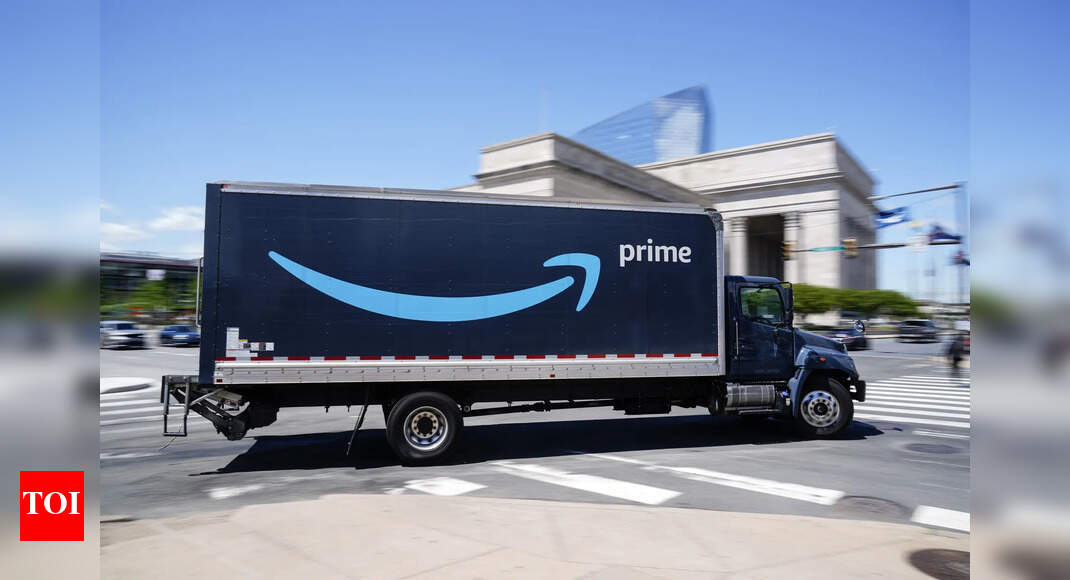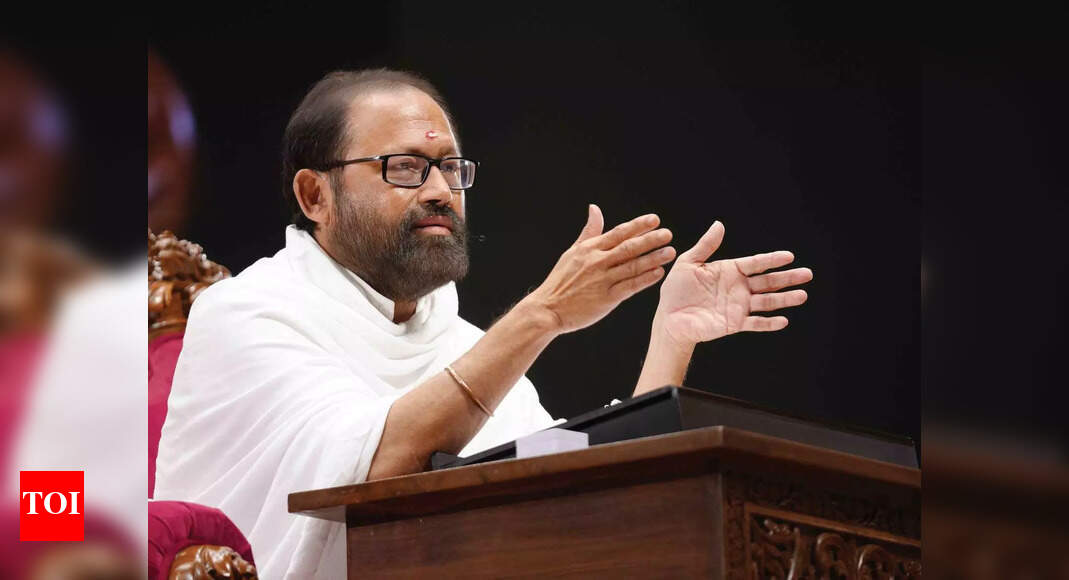Amazon.com Inc has denied reported plan to display the cost of U.S. tariffs on its product listings, following a sharp rebuke from the White House and a reported direct phone call from President Donald Trump to Amazon founder Jeff Bezos. The e-commerce giant issued a statement saying that the idea was only under consideration for its “ultra low cost Amazon Haul store” and “was never a consideration for the main Amazon site,” adding that “nothing has been implemented on any Amazon properties.”
“This was never approved and is not going to happen,” reads Amazon’s statement.
This denial came after a brief report by Punchbowl News suggesting Amazon would “soon” begin itemizing U.S. tariff costs next to the listed price of individual products. The White House reacted with immediate and strong condemnation.
Angry White House terms it Hostile Act
“This is a hostile and political act,” White House Press Secretary Karoline Leavitt told reporters during a briefing. She questioned the timing of the purported move, asking, “Why didn’t Amazon do this when the Biden administration hiked inflation to the highest level in 40 years?”
Leavitt also revealed that she had spoken with President Trump about the report and criticized Amazon’s compliance with Chinese government censorship demands. Adding to the pressure, a person familiar with the situation confirmed that President Trump called Jeff Bezos on Tuesday morning, a report first carried by CNN.
The immediate fallout from the White House’s comments was felt in the stock market, with Amazon shares briefly dipping by as much as 2.1% at the start of trading in New York. The stock later pared some of those losses. The company is scheduled to release its earnings report after the market closes on Thursday, with its stock already down over 20% from its February peak.
The context of the potential tariff display involves the U.S. government’s recent decision to end the “de minimis” exemption for small packages arriving from mainland China and Hong Kong. This exemption had allowed goods valued under $800 to enter the U.S. without tariffs. Companies like Temu and Shein, which rely heavily on direct-to-consumer shipping of lower-cost goods, are expected to face a significant 120% tariff on many of their products as a result. While some Amazon shipments also qualified for this exemption, the company also imports goods in bulk for its U.S. warehouses.
Amazon launched Haul to take on Temu and Shein
Amazon’s Haul service, launched last year as a direct response to the growing popularity of low-cost platforms like Temu, ships items directly from sellers, including those in China. Sources familiar with the matter indicated that the now-abandoned import charge disclosure was linked to the end of the de minimis exemption, rather than a direct response to the White House’s broader tariff policies.
When asked if the incident had strained the relationship between President Trump and Jeff Bezos, who has reportedly sought to improve his standing with the former president recently, Leavitt declined to comment. “I will not speak to the president’s relationships with Jeff Bezos,” she stated. Notably, Bezos and Trump had a frequently contentious relationship during Trump’s first term, largely stemming from Bezos’s ownership of The Washington Post.
What made the Tariff listing plan unfair
According to Bloomberg report, Treasury Secretary Scott Bessent, who was present at the press briefing, argued that singling out tariff costs was unfair when the costs associated with other government policies, such as regulations, were not similarly itemized. “The big tax on consumers that goes unnoticed is deregulation or regulation, and we are deregulating and bringing that down,” Bessent asserted. “So you know, from a household income point of view, we would expect real purchasing increases that we’ve seen over the first 100 days, and we would expect that to accelerate.”
The controversy unfolds against a backdrop of public concern regarding the economy. A CNN poll released this week revealed that 59% of the public believe Trump’s policies have worsened the economy, with 60% feeling his efforts have increased their cost of living. Furthermore, nearly 70% of survey respondents anticipate an economic recession within the next year.
var _mfq = window._mfq || [];
_mfq.push([“setVariable”, “toi_titan”, window.location.href]);
!(function(f, b, e, v, n, t, s) {
function loadFBEvents(isFBCampaignActive) {
if (!isFBCampaignActive) {
return;
}
(function(f, b, e, v, n, t, s) {
if (f.fbq) return;
n = f.fbq = function() {
n.callMethod ? n.callMethod(…arguments) : n.queue.push(arguments);
};
if (!f._fbq) f._fbq = n;
n.push = n;
n.loaded = !0;
n.version = ‘2.0’;
n.queue = [];
t = b.createElement(e);
t.async = !0;
t.defer = !0;
t.src = v;
s = b.getElementsByTagName(e)[0];
s.parentNode.insertBefore(t, s);
})(f, b, e, ‘https://connect.facebook.net/en_US/fbevents.js’, n, t, s);
fbq(‘init’, ‘593671331875494’);
fbq(‘track’, ‘PageView’);
};
function loadGtagEvents(isGoogleCampaignActive) {
if (!isGoogleCampaignActive) {
return;
}
var id = document.getElementById(‘toi-plus-google-campaign’);
if (id) {
return;
}
(function(f, b, e, v, n, t, s) {
t = b.createElement(e);
t.async = !0;
t.defer = !0;
t.src = v;
t.id = ‘toi-plus-google-campaign’;
s = b.getElementsByTagName(e)[0];
s.parentNode.insertBefore(t, s);
})(f, b, e, ‘https://www.googletagmanager.com/gtag/js?id=AW-877820074’, n, t, s);
};
function loadSurvicateJs(allowedSurvicateSections = []){
const section = window.location.pathname.split(‘/’)[1]
const isHomePageAllowed = window.location.pathname === ‘/’ && allowedSurvicateSections.includes(‘homepage’)
if(allowedSurvicateSections.includes(section) || isHomePageAllowed){
(function(w) {
function setAttributes() {
var prime_user_status = window.isPrime ? ‘paid’ : ‘free’ ;
w._sva.setVisitorTraits({
toi_user_subscription_status : prime_user_status
});
}
if (w._sva && w._sva.setVisitorTraits) {
setAttributes();
} else {
w.addEventListener(“SurvicateReady”, setAttributes);
}
var s = document.createElement(‘script’);
s.src=”https://survey.survicate.com/workspaces/0be6ae9845d14a7c8ff08a7a00bd9b21/web_surveys.js”;
s.async = true;
var e = document.getElementsByTagName(‘script’)[0];
e.parentNode.insertBefore(s, e);
})(window);
}
}
window.TimesApps = window.TimesApps || {};
var TimesApps = window.TimesApps;
TimesApps.toiPlusEvents = function(config) {
var isConfigAvailable = “toiplus_site_settings” in f && “isFBCampaignActive” in f.toiplus_site_settings && “isGoogleCampaignActive” in f.toiplus_site_settings;
var isPrimeUser = window.isPrime;
var isPrimeUserLayout = window.isPrimeUserLayout;
if (isConfigAvailable && !isPrimeUser) {
loadGtagEvents(f.toiplus_site_settings.isGoogleCampaignActive);
loadFBEvents(f.toiplus_site_settings.isFBCampaignActive);
loadSurvicateJs(f.toiplus_site_settings.allowedSurvicateSections);
} else {
var JarvisUrl=”https://jarvis.indiatimes.com/v1/feeds/toi_plus/site_settings/643526e21443833f0c454615?db_env=published”;
window.getFromClient(JarvisUrl, function(config){
if (config) {
const allowedSectionSuricate = (isPrimeUserLayout) ? config?.allowedSurvicatePrimeSections : config?.allowedSurvicateSections
loadGtagEvents(config?.isGoogleCampaignActive);
loadFBEvents(config?.isFBCampaignActive);
loadSurvicateJs(allowedSectionSuricate);
}
})
}
};
})(
window,
document,
‘script’,
);



